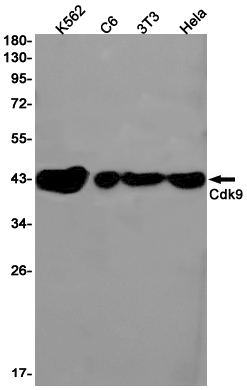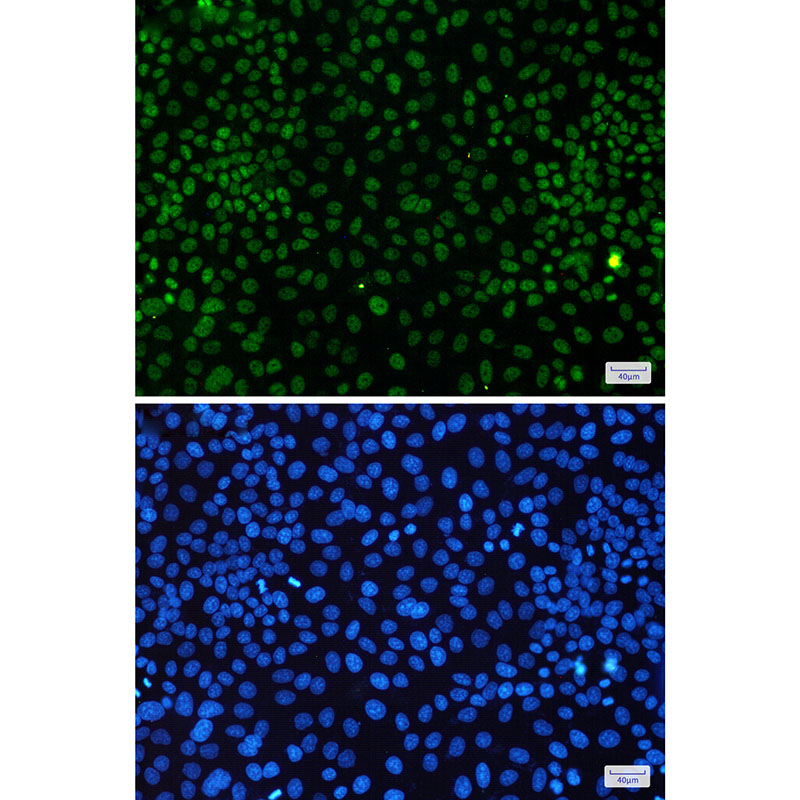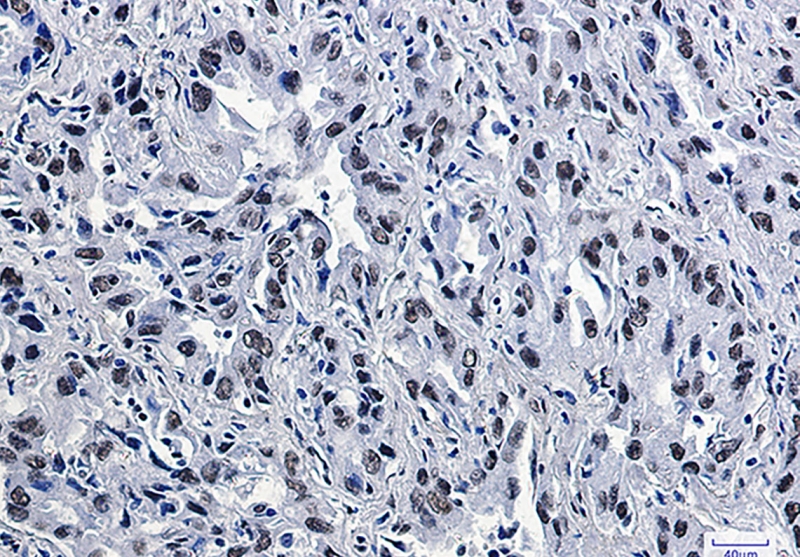


| WB | 咨询技术 | Human,Mouse,Rat |
| IF | 1/20 | Human,Mouse,Rat |
| IHC | 1/50-1/100 | Human,Mouse,Rat |
| ICC | 1/50-1/200 | Human,Mouse,Rat |
| FCM | 咨询技术 | Human,Mouse,Rat |
| Elisa | 咨询技术 | Human,Mouse,Rat |
| Aliases | TAK; C-2k; CTK1; CDC2L4; PITALRE |
| Entrez GeneID | 1025 |
| WB Predicted band size | Calculated MW: 43 kDa; Observed MW: 43 kDa |
| Host/Isotype | Rabbit IgG |
| Antibody Type | Primary antibody |
| Storage | Store at 4°C short term. Aliquot and store at -20°C long term. Avoid freeze/thaw cycles. |
| Species Reactivity | Human,Mouse,Rat |
| Immunogen | A synthetic peptide of human Cdk9 |
| Formulation | Purified antibody in TBS with 0.05% sodium azide,0.05%BSA and 50% glycerol. |
+ +
以下是关于CDK9抗体的3篇代表性文献及其摘要内容:
---
1. **文献名称**:*A selective CDK9 inhibitor with preferential antiviral activity against latent HIV*
**作者**:Zhou M, Duan H, et al.
**摘要**:该研究开发了一种选择性CDK9小分子抑制剂,并利用CDK9抗体验证其对HIV潜伏感染的调控作用。结果显示,抑制CDK9活性可降低病毒转录,为HIV潜伏库清除提供了潜在策略。
---
2. **文献名称**:*CDK9-dependent RNA polymerase II phosphorylation regulates transcriptional elongation in acute myeloid leukemia*
**作者**:Krystof V, Baumli S, et al.
**摘要**:通过CDK9特异性抗体研究其在急性髓系白血病中的功能,发现CDK9通过磷酸化RNA聚合酶II调控致癌基因(如MYC)的转录延伸,靶向CDK9可抑制白血病细胞增殖。
---
3. **文献名称**:*Structural insights into CDK9 inhibition by natural compound curcumin*
**作者**:Baumli S, Lolli G, et al.
**摘要**:利用CDK9抗体进行免疫共沉淀实验,结合X射线晶体学解析姜黄素与CDK9/细胞周期蛋白T1复合物的结构,揭示其通过竞争性结合激酶活性位点抑制CDK9的机制。
---
**备注**:若需具体文献来源或发表年份,可进一步补充数据库检索信息(如PubMed ID)。
CDK9 (Cyclin-Dependent Kinase 9) is a serine/threonine kinase belonging to the CDK family, primarily known for its role in transcriptional regulation. It forms a critical component of the positive transcription elongation factor b (P-TEFb) complex, which phosphorylates the C-terminal domain (CTD) of RNA polymerase II to promote transcriptional elongation. CDK9 activity is essential for the expression of many immediate early genes, including proto-oncogenes and stress-response factors, and it plays a key role in HIV replication by interacting with the viral Tat protein to enhance viral transcription.
Dysregulation of CDK9 has been implicated in various diseases, particularly cancers, where its overexpression or hyperactivation is linked to uncontrolled cell proliferation and survival. Additionally, CDK9 inhibition has emerged as a therapeutic strategy to disrupt oncogenic transcription and induce apoptosis in cancer cells. In virology, targeting CDK9 may suppress viral replication, highlighting its broad biomedical relevance.
CDK9 antibodies are vital tools for studying its expression, localization, and interactions in both normal and pathological contexts. They are widely used in techniques like Western blotting, immunoprecipitation, and immunofluorescence to explore CDK9’s regulatory mechanisms, including its association with cyclin T1/T2 and post-translational modifications. Researchers also employ these antibodies to evaluate CDK9’s potential as a biomarker or therapeutic target in diseases. Furthermore, they aid in validating the specificity of CDK9 inhibitors, which are under investigation in preclinical and clinical studies for cancer and antiviral therapies.
×